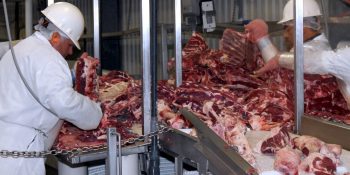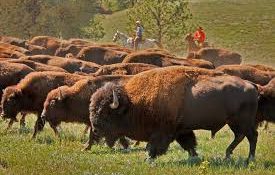Image provided by MGN on-line. please note this image was NOT taken during the COVID-19 pandemic.
Denver — Today, Colorado U.S. Senator Michael Bennet sent a letter to the United States Department of Agriculture (USDA) Inspector General Phyllis Fong and the United States Department of Labor (DOL) Acting Inspector General Larry Turner requesting an investigation into federal actions that may have contributed to the spread of the Coronavirus Disease 2019 (COVID-19) in meat processing facilities and other agricultural processing facilities.
Specifically, Bennet requested Fong and Turner review steps the federal government took to prevent the spread of COVID-19 in meat processing facilities and how President Donald Trump’s use of the Defense Production Act to keep these facilities open may have affected the health of workers.
“Meat processing plants have had some of the highest rates of COVID-19 infections, harming a workforce predominately comprised of immigrants, refugees, and People of Color who are at a higher risk for COVID-19…While many industries suffered from COVID-19 outbreaks, the high incidence of outbreaks at these facilities, even very early in the pandemic, raises questions,” wrote Bennet. “In Weld County, Colorado, there were reports of increased doctors’ visits among meat processing plant employees throughout March, with dozens of confirmed cases, 14 hospitalizations, and at least two worker deaths by April 10…By May 5, hundreds of United States Department of Agriculture (USDA) Food Safety and Inspection Service (FSIS) employees had been exposed to or tested positive for COVID-19, and three individuals had died.”
In the letter, Bennet specifically requested Fong and Turner review:
- USDA and United States Department of Labor’s actions (or inaction) regarding meat processing plants and the related COVID-19 outbreaks
- The use of voluntary health and safety standards at meat processing facilities
- The federal government’s communication of authority, standards, and expectations with state, local, worker, and industry stakeholders
- The movement of USDA inspectors between facilities amid outbreaks
- The provision of personal protective equipment to USDA inspectors
- Any federal actions following the Defense Protection Act order on April 28, 2020 that affected outbreaks at meat processing and other agricultural facilities.
Bennet has continuously voiced his concern regarding the safety of workers at meat processing facilities and other agricultural processing facilities during the pandemic. In April, Bennet sent a letter urging Vice President Mike Pence and other members of the Trump Administration to help ensure the safety of the nation’s food supply and to protect essential workers in the food supply chain during the pandemic. In May, Bennet sent a letter to Pence requesting an update on the delivery of promised testing and PPE to protect workers at the JBS meatpacking plant in Greeley. In the letter, he highlighted the importance of testing to protect the workers, their families, and the surrounding communities and safeguard our nation’s food supply. Later that same month, Bennet and his colleagues raised concerns about the Trump Administration’s Executive Order that pressured meat processing facilities to open without verifying the necessary safety measures to protect workers and the food supply. In June, Bennet joined UFCW Local 7 in Greeley to honor the hardworking UFCW Local 7 members who lost their lives while serving on the front lines of the pandemic.
The text of the letter is available HERE and below.
SPREAD THE NEWS
COMMENT, Like, Follow & SHARE @I70Scout
CURRENT EDITION
WEATHER & TRAFFIC PUZZLES RECENT NEWS ADVERTISE WITH US

